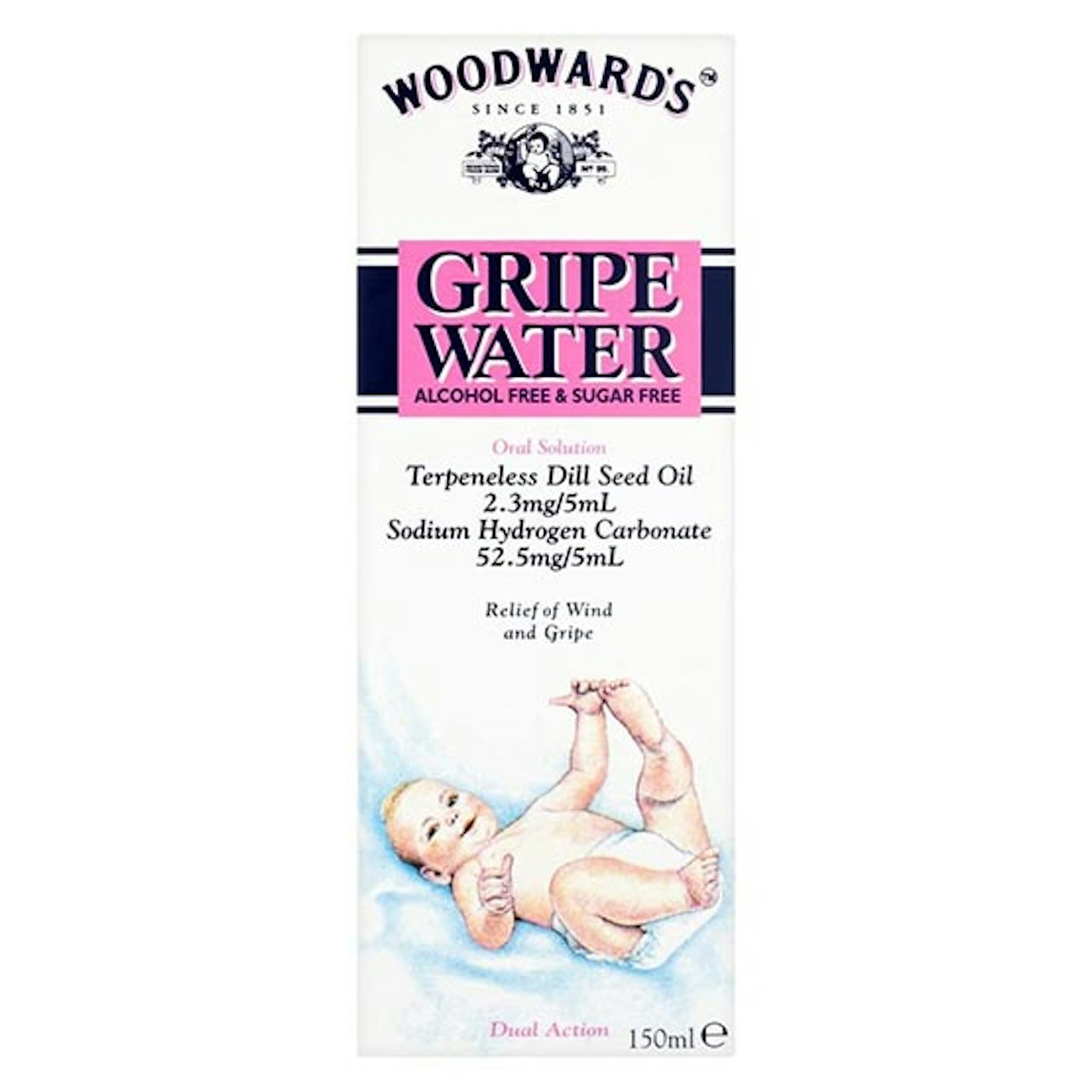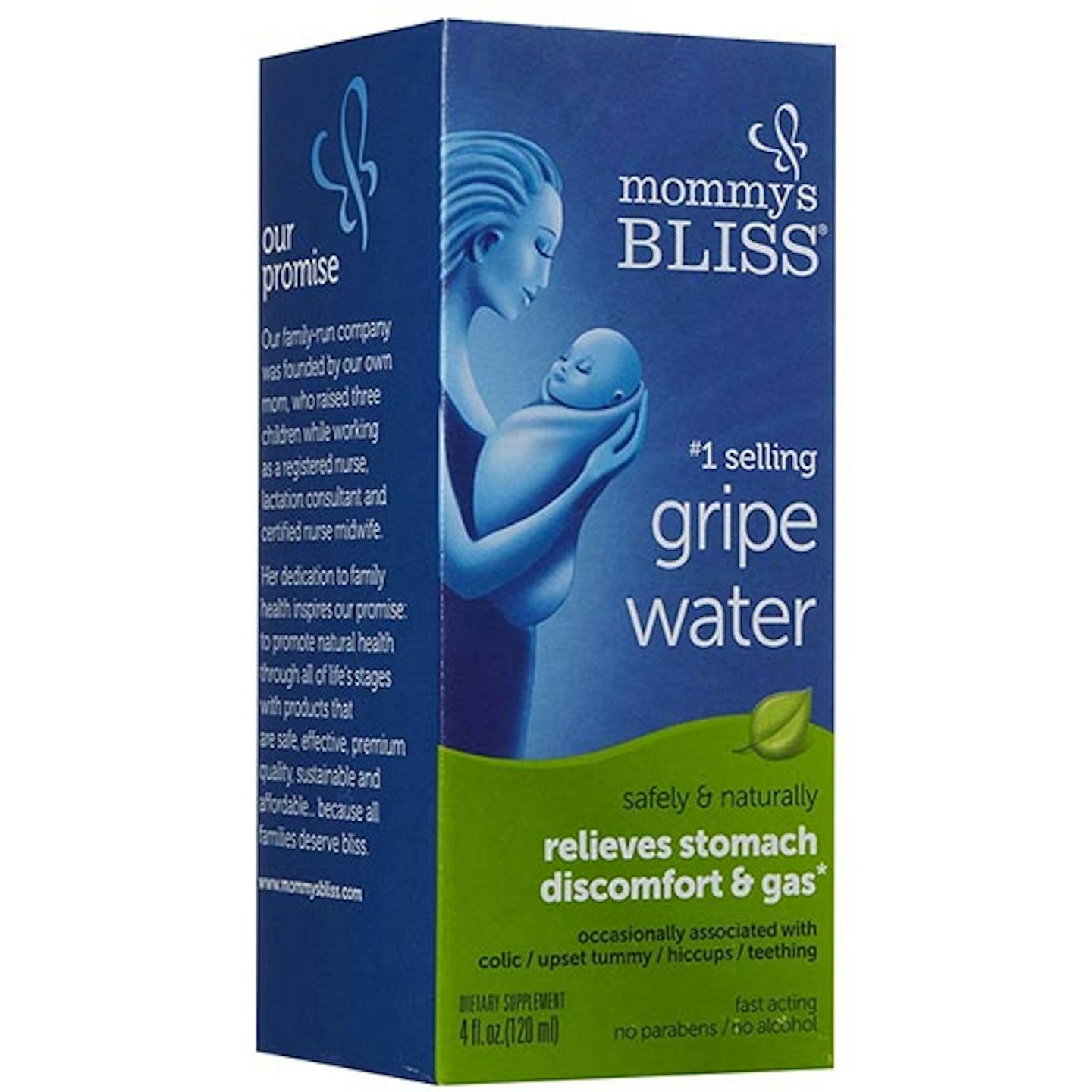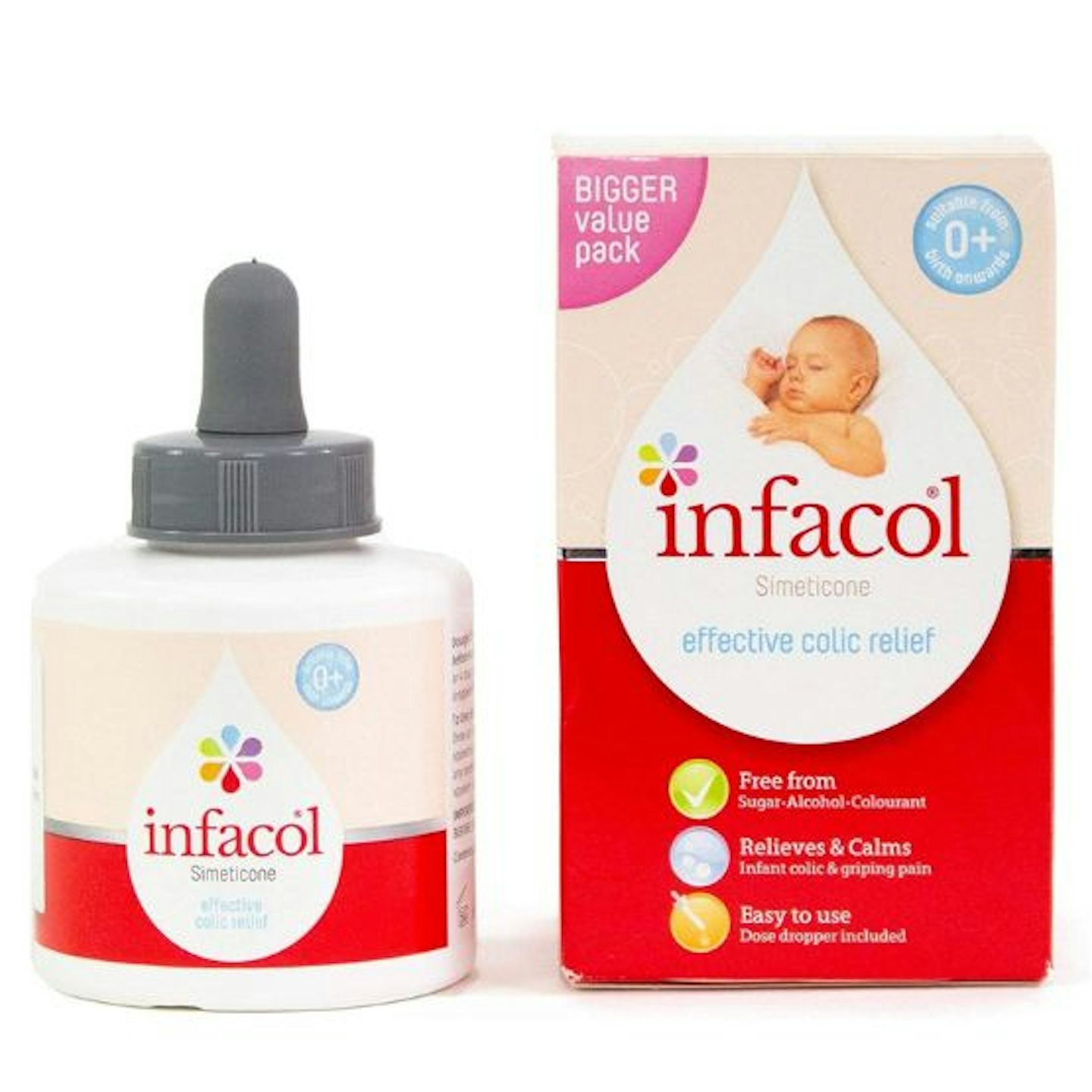If your baby has ever experienced tummy troubles, you’ll know the feeling of desperately looking for a remedy to help alleviate their discomfort. Gripe water is the go-to for some parents when their baby or toddler suffers from colic or other gastrointestinal problems, but you might wonder what gripe water is.
Gripe water is a solution that was invented in the 19th century and has been used to soothe little ones ever since. But what is gripe water, what's it made of, how much should you give babies - and, most importantly, does it really work? There's much debate about the uses of gripe water and the alternatives, so it can be confusing to figure it all out when you just want to soothe your crying baby.
To help, we've done the research for you and spoken to experts, Registered Nutritional Therapist Julie Clark, former midwife Rachel FitzD, and GP Dr Ellie Cannon to find out all you need to know about gripe water, its uses, side effects and alternatives.

What is gripe water?
Gripe water is a liquid solution available over the counter. It's made from sodium bicarbonate and herbs. The exact gripe water ingredients tend to vary from country to country, but the main active components have remained the same through the years. Julie Clark explains that all gripe water products contain sodium bicarbonate or sodium hydrogen carbonate.
"There are other ingredients added, most commonly dill oil in the original gripe water, but other products can also contain ginger and or fennel,” she says. You may also get some sweeteners or glucose, depending on the brand. The original gripe water contained sodium hydrogen carbonate, dill oil, and alcohol.”
What do you use gripe water for?
Gripe water generally relieves the pain and discomfort caused by trapped wind by breaking down the air bubbles. This means gripe water can help ease colic symptoms, ease pain caused by digestive problems, get rid of baby hiccups and release wind when trying to burp your baby. However, the effectiveness of gripe water is unproven, so it shouldn't be seen as a foolproof or standalone solution. In particular, our expert, Rachel, notes that gripe water is unlikely to help with acid reflux, so you should look for alternatives or speak to your doctor if your baby is suffering from reflux.
Does gripe water help with colic?
Many mums use gripe water as a remedy for common newborn tummy troubles, such as colic, due to the effects of its ingredients.
However, according to the NHS, while gripe water works by breaking down trapped gas bubbles, it is not necessarily recommended as a remedy for colic.
"Gripe water has two active ingredients: sodium hydrogen carbonate, which is an antacid, and the dill seed oil, which is used to reduce wind in the baby," says Dr Ellie Cannon, author of ‘Keep Calm: The New Mum's Manual: Trust Yourself and Enjoy Your Baby’.
"Sodium bicarbonate helps to reduce stomach acid and is often used as a natural anti-acid," says Clark. "Other ingredients added include herbs such as dill, fennel and ginger. These are known to assist digestion and can calm the tummy."
However, as Rachel FitzD notes, colic isn't necessarily caused by wind, so gripe water is unlikely to have any real benefit in easing pain and crying. The NHS also notes that there is little evidence that gripe water works for colic, and both Dr Ellie and Julie agree that there’s little scientific evidence to prove that gripe water is effective. Nevertheless, many parents swear by the remedy despite the lack of physical evidence. "There is very little scientific evidence to confirm that gripe water works," says Julie. "Overall, though, I know many mums swear by it, and I’m unaware of any serious problems." Rachel agrees that it's unlikely to help with colic, and other methods could be more effective as we explore later.
Are there any side effects or risks to using gripe water?
Clark says there could be a few gripe water side effects in unusual circumstances. "The side effects to gripe water – although these do seem rare – can include an allergic reaction to ingredients, especially the added herbs, or a lowering of stomach acid, which is not a good thing in the long term as the stomach provides an important role in immunity and the correct breakdown of foods," she says.
"I think the biggest issue with these types of ‘products’ is that it is a foreign substance being introduced to a very young baby – often just a few weeks old."
Is gripe water good for newborns?
While gripe water suits babies, Dr Ellie does not recommend giving it to newborns, saying, "It’s only for use in babies who are a month or older."
According to Dr. Ellie, it’s important to read the label before giving gripe water to your baby. Too much could cause side effects, so she advises carefully following the exact dosing on the bottle.
We'd also recommend you speak to your doctor for gripe water recommendations and ensure the one you choose suits your baby. It should never be given in large quantities or used as a substitute for anything in their diet. You should also make sure it doesn't contain sugar or alcohol.
How to use gripe water
Gripe water can be administered to your baby in a variety of ways. While it’s typically given through an oral syringe or dropper, you can also mix gripe water with breastmilk or formula before feeding. However, putting gripe water in milk may reduce its efficacy.
As mentioned, you'll want to carefully read all the gripe water ingredients and instructions. You should double-check the ingredients to ensure they are alcohol- and sucrose-free and don't contain carbo vegetables (which can cause constipation). You'll also want to ensure you get the dose right for your little one.
Alternatives to gripe water
As the jury is still out on whether gripe water can help your baby, there are some alternative ways to soothe the spasms in your baby's gut that cause colic pain and reduce the air bubbles that can cause wind and stomach pain.
Try some tummy time
Some pressure on a baby's tummy can help provide some relief. Not only does this help strengthen their neck muscles, but it's also very fun for the baby and helps you bond. Remember, tummy time should only be done when the baby is awake and alert; the baby should always sleep on its back.
If your little one is currently a bit too small for tummy time on the floor, you can try adding some pressure to their tiny tummy by placing your hand on baby's tummy while you're winding them or lying baby down on your lap or in their bed or cot and giving them a little tummy rub.
Give your baby a massage
Also, regularly wind your baby during feeds, and try giving them a relaxing baby massage when they're uncomfortable or irritated.
Movements like bicycle legs can really help babies relieve gas. This works similarly to baby tummy time, as this pressure on the tummy can help relieve wind, too. You can even use relaxing baby massage oils to calm them even more.
Warm baths
Giving your baby a bath can soothe their tummies and relax their muscles, alleviating the pain of colic spasms. A baby bath thermometer can take the guesswork out of ensuring it's warm enough to soothe but not too hot.
Hold baby in your arms
Rachel also tells us that soothing and relaxing your baby is the best way to ease the gut spasms that can cause pain. Holding and rocking them can help relax them and their stomachs. You could try wearing a baby sling or carrier to keep them close while also allowing you to have your hands free.
Check their formula
If your baby is on formula, try changing it to see if that could be causing any problems for its sensitive tummy. You may want to try a ready-to-feed formula instead of a powder mix, as all the shaking and stirring can generate bubbles, making your baby even more gassy and uncomfortable. If you're unsure what to switch to, speak with your health visitor or doctor for their recommendations.
Alter your feeding technique
When feeding your baby, you should make sure the nipple of the bottle is completely full of milk. This will help eliminate any unwanted air bubbles. You might also want to change the kind of bottle you're using, too, if this doesn't help. You could try an anti-colic baby bottle that minimises the amount of milk they take while drinking. Rachel FitzD notes that if you're breastfeeding, allowing the baby to feed will relax and soothe them - the suckling motion is relaxing for the gut, and you can also use a dummy to help with this.
Regular winding
Bottle-fed babies may take in more air, which can cause discomfort. Rachel recommends bringing babies up to wind them regularly when you're feeding them, which will help to reduce the air bubbles and discomfort they might feel.
Swaddle your baby
If tummy troubles cause them to be upset and uncomfortable, swaddling your baby in a nice warm blanket can bring them some real comfort. Once you've successfully swaddled your baby, try gently rocking them while holding them in your arms.
Try soothing them with sound
Babies can react well to sound, so try singing them a lullaby to calm them down or even hum the tune if you don't feel like singing. Whispering a gentle shh sound in their ear can also help.
If you're trying to get baby off to sleep, try a white noise machine, or if you don't have one, do some vacuum cleaning, hair drying or put a fan on (if the weather is hot).
Other medications and remedies
You could try some other oral remedy alternatives to gripe water but always check with your doctor first.
Simethicone - Most recognisable as Infacol, this is an antiflatulent medicine used to treat wind. It can be bought at pharmacies and taken as tablets**,** capsules, drops, or liquid.
Peppermint oil - Another treatment for IBS and nausea, this natural oil helps relax the stomach.
Activated charcoal – this can sometimes ease trapped wind. This is ideal for children ages 1-12.
Sodium bicarbonate – This reduces and neutralises stomach acid to help with heartburn, indigestion and upset stomachs.
Babies and Gripe Water
While seeing your baby crying and uncomfortable with colic or digestive issues is hard, just remember that it will pass. Most babies' colic symptoms improve by the time they're 3-4 months old as their digestive systems mature. But remember to ask for help if you need it - if your baby is crying a lot and not sleeping, you're probably going to benefit from rest and letting someone else soothe your baby for a bit if possible.
Where can I buy Gripe Water?
1.
Woodward's Gripe Water
Best gripe water overall
 Woodward's
Woodward'sThis oral solution is alcohol—and sugar-free, making it suitable for babies. It is formulated with dill oil, which warms and relaxes the tummy, and sodium hydrogen carbonate, which helps neutralise acid in the baby’s tummy.
| Age | Suitable for Babies 1 month to 12 months |
| Size | 150ml |
Best gripe water with natural ingredients
 Mummys bliss
Mummys blissuk.vitamingrocer.com
This vegan formula contains only all-natural products. It is powered by organic fennel and ginger. It contains no alcohol, chemicals, parabens, artificial flavours, or colours. Every box also contains a dropper for easy dosing.
| Age | Suitable from two weeks old |
| Size | 120ml |
Best gripe water for ease
 Infacol
Infacolwww.tesco.com
This alternative to Gripe water relieves and calms wind, infant colic, and griping pain. It is free from sugar, alcohol, and colourants. It has an orange flavour to help the baby take it more readily and is a convenient-to-use dropper for easy application.
By giving Infacol colic relief drops before each feed, they combine the small trapped gas bubbles into bigger bubbles, which your baby can easily bring up as wind. According to the Infant Colic Real World Evidence (iCore) Study, 97% of parents found their babies cried less and that symptoms settled in 9 out of 10 babies.
| Age | Suitable from newborn |
| Size | 55ml |
About the experts
Dr Ellie Cannonis a dynamic, straight-talking GP, mum of two, and author of Keep Calm: The New Mum’s Manual (£10.99, Vermilion). She is well known for her health pages in the Mail on Sunday and her vibrant presence across TV, radio and social media. Ellie is a true medical expert with the authority to write and broadcast on all aspects of health and the NHS. She has authored books on mental health and parenting and is celebrated as a myth-buster and voice of sense within health and science.
Julie Clark is a Registered Nutritional Therapist and author of 'Baby Led Weaning Step by Step' who uses her knowledge as a nutritionist and experience as a parent to help families to enjoy a healthy life with easy and practical advice.
Rachel Fitz-D is an active birth teacher, parenting consultant and author of Baby Skin To Skin, with over 30 years working as a midwife and as a parenting consultant. Based in Berkshire, near London, she has appeared on numerous radio programmes, talking about various issues from infant feeding to smacking to humanist parenting. She co-created Henley Birthcare, a unique freelance midwifery and doula service offering bespoke care.
Lorna White is the Products Editor for Mother&Baby. After running the Yours magazine website, specialising in content about caring for kids and grandchildren, Lorna brought her expertise to Mother&Baby in 2020. She has a keen interest in a range of topics from potty training and nutrition to baby names and early development and has a wide range of experienced medical experts and professionals at her fingertips. In her spare time, she enjoys spending time with her two young sisters, dog walking and enjoying the outdoors with her family.
